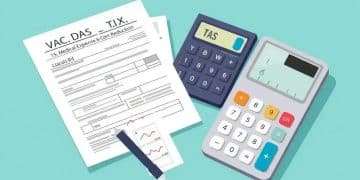Tax breaks for seniors: Unlock valuable benefits now

Tax breaks for seniors include various credits and deductions that can significantly reduce taxable income, helping retirees manage their finances more effectively.
Tax breaks for seniors offer a great opportunity to ease financial burdens in retirement. Have you thought about how these breaks could benefit your lifestyle? Let’s delve into their advantages and how you can take advantage of them.
Understanding tax breaks available for seniors
Understanding tax breaks available for seniors can help improve their financial situation. Many seniors are unaware of the benefits they can access. This article will explain these breaks clearly.
Types of Tax Breaks
There are several types of tax breaks that seniors might qualify for. Not all seniors will benefit from each type, but it’s crucial to understand what is available. The most common breaks include:
- Standard Deduction: Seniors can claim a higher standard deduction.
- Property Tax Exemptions: Some states offer exemptions or reductions on property taxes for seniors.
- Tax Credits: Seniors may qualify for various tax credits, which can reduce their overall tax bill.
By knowing what breaks are out there, seniors can better prepare their finances. Many may not realize they are eligible for tax credits, which offer substantial savings.
Eligibility Criteria
To qualify for these tax breaks, seniors often need to meet specific criteria. For example, income levels can play a significant role. In many cases, these breaks aim to assist those with lower incomes more effectively. Seniors must also consider age limits; typically, individuals must be 65 or older.
Some states may have additional requirements, such as residency. It’s important to check local laws to understand what applies. This knowledge helps seniors maximize their financial benefits.
In addition to general tax breaks, some specific programs cater to particular needs. For example, educational tax breaks and benefits for caregivers can also be relevant.
Eligibility criteria for senior tax breaks

When considering eligibility criteria for senior tax breaks, it’s essential to know what requirements apply. These breaks are designed to help seniors with lower incomes or specific situations. Understanding the criteria can help more seniors take advantage of these beneficial programs.
Common Eligibility Requirements
First, seniors typically need to be at least 65 years old to qualify for many tax breaks. This age requirement helps identify those in retirement who may need more financial assistance. However, laws can vary by state, so it’s important to check local regulations.
- Income Limits: Many tax breaks have specific income limits that seniors must meet. These limits can affect eligibility for various benefits.
- Residency Requirements: Seniors often need to be residents of the state offering tax breaks to qualify.
- Filing Status: The way seniors file their taxes, whether single or married, can impact their eligibility for specific breaks.
Each state may have additional requirements or variations. Understanding these details will help seniors better prepare their finances. Some programs also consider factors like whether a senior has dependents or specific health conditions.
Documentation Needed
To apply for tax breaks, seniors usually need to provide specific documentation. Commonly required documents include proof of age, income statements, and residency verification. Gathering these documents in advance can streamline the application process. Additionally, it’s advisable to keep a record of any relevant medical expenses, as they can also affect eligibility.
Staying informed about the local tax laws can make a significant difference. Many community centers offer resources to help seniors understand their rights and benefits better. Utilizing these resources can lead to substantial savings in taxes.
How to apply for tax breaks as a senior
Knowing how to apply for tax breaks as a senior can help you save money and reduce expenses. The application process may seem complicated, but it is manageable with the right information. Understanding the necessary steps is critical to receive the benefits you deserve.
Gather Required Documents
Before starting the application, gather all necessary documents. These typically include proof of age, income statements, and proof of residency. Having these documents ready will make the application process smoother.
- Proof of Age: A birth certificate or government ID can serve as verification.
- Income Statements: Gather your Social Security statements, pension information, and any other income proof.
- Proof of Residency: A utility bill or lease agreement can help demonstrate where you live.
Providing correct documents ensures that the application moves swiftly. It reduces the chances of delays caused by missing information.
Fill Out the Application
Once you have the documents, the next step is filling out the application form. Many states provide applications online, making it easy to start. Take your time to fill in the details accurately, as errors can delay your approval.
Be sure to include all required fields and double-check for any mistakes. Some forms may also have additional questions specific to the benefits offered. Complete them thoroughly to avoid confusion later.
If you feel uncertain, consider seeking help from family members or community organizations. Many local groups assist seniors in navigating the application process. They can offer guidance and answer questions that may arise.
Submitting the Application
After filling out the application, review everything again before submission. You might submit your application online, via mail, or in person, depending on the state guidelines. Be sure to keep a copy for your records.
After submission, the waiting period may vary. Stay informed about the status of your application. If you encounter any issues, don’t hesitate to contact the relevant tax authority for clarification. It’s essential to be proactive in following up, which can help expedite the process.
Tips for maximizing tax savings for seniors

Maximizing tax savings for seniors can lead to significant financial relief. By understanding various strategies, seniors can reduce their taxable income and increase their savings. This section outlines practical tips that can help seniors make the most of available benefits.
Consider Tax Credits
Seniors should research available tax credits that can lower their overall tax bill. Several credits specifically benefit seniors, including:
- Credit for the Elderly or Disabled: This credit provides relief for seniors with limited income.
- Education Credits: Seniors taking classes to improve skills may qualify for educational tax credits.
- Medical Expense Deductions: Seniors can often deduct significant medical expenses, which can drastically reduce taxable income.
Understanding these credits and how to apply for them can lead to considerable savings.
Keep Accurate Records
Maintaining detailed records throughout the year is essential for claiming deductions. Seniors should keep records of medical bills, charitable donations, and any tax-related expenses. Organizing these documents can make tax season less stressful and ensure that they do not miss out on potential deductions.
Using a dedicated folder or digital tool can help track these expenses efficiently. Being proactive with record-keeping can result in maximum savings.
Review Filing Status
Seniors should evaluate their tax filing status annually. Choosing the right filing status can greatly affect the amount of taxes owed. Consider whether filing jointly or separately with a spouse may yield a better tax rate, especially if one partner has significantly lower earnings.
Consulting a tax professional can provide valuable insights into which status may give the best tax outcome for your specific situation. This way, seniors can ensure they are benefiting from the most favorable tax treatment possible.
Plan Charitable Donations
Making charitable donations can offer valuable tax deductions for seniors. It is advisable to plan these donations carefully throughout the year. Not only does this give back to the community, but it can also lower taxable income. Remember to keep receipts and records of all donations for tax purposes.
Taking advantage of donation matching programs through employers can also enhance the impact of charitable giving. By strategically planning donations, seniors can maximize their tax benefits while supporting causes they care about.
FAQ – Frequently Asked Questions About Tax Breaks for Seniors
What types of tax breaks are available for seniors?
Seniors may qualify for various tax breaks, including the Credit for the Elderly or Disabled, medical expense deductions, and additional exemptions depending on their state.
How can I find out if I’m eligible for these tax breaks?
To determine eligibility, check your age, income, and residency status. Local tax authorities often provide resources to help assess qualifications.
What documents do I need to apply for tax breaks?
Gather important documents such as proof of age, income statements, and residency verification to ensure a smooth application process.
Can charitable donations affect my tax savings?
Yes, making charitable donations can provide tax deductions for seniors, helping to reduce taxable income while supporting causes they care about.






